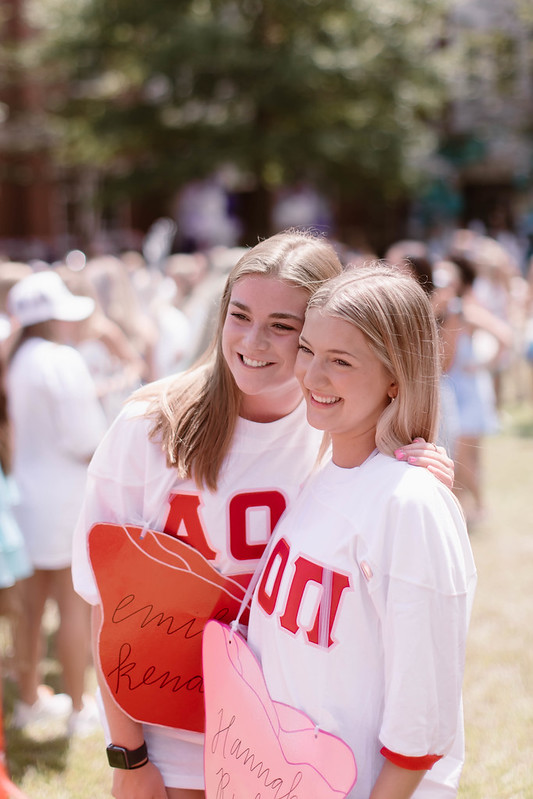Panhellenic recruitment Bid Day is just the beginning
Article body
Don’t be alarmed when you hear a sudden roar of high pitched screaming and cheering later today. That’s the elated crescendo of 1,735 young women who make up the newest members of the Panhellenic Council at Auburn University. After opening their Bid Day letters telling them which sorority mutually selected them, they’ll make the 100-yard dash from the Neville Arena to the Village Residence Halls into the open arms of their new sisterhood.
“Bid Day is such a special day to experience regardless of if you are an active member or a new member. The energy and excitement throughout the Village is unmatched — and it’s crazy fun to watch,” said Panhellenic President Amanda Barkley.
The giddy stampede to the Village on Bid Day is the last step in the Panhellenic Council recruitment process, better known as sorority rush. For the past two weeks, 1,894 young women – the largest recruitment class in Auburn history – have been getting to know each other and the 48% of women on campus currently affiliated with the 18 sororities that make up the Panhellenic Council. Of those going through recruitment, 92% matched with a sorority.
“We typically place between 90 and 92% of our recruitment class and we’re very proud of that,” said Lindsay Holdren, director of Greek Life at Auburn. “If you have an open mind about joining, there is a place for you. The majority of the people who don’t join decide to withdraw and not to move forward through the recruitment process.”
Auburn women have gravitated toward sororities since they first were established on campus in 1929. The stats on leadership, success and empowerment speak for themselves: 83.4% of students involved in Greek Life graduate in four years; and 84.93% of students involved in Greek Life are employed within six months of graduation.
That being said, most Auburn women join a sorority for a different reason.
“The number one reason people tell us they join is that they want to build community and make friends,” Holdren said.
“I came from out of state so I was interested in finding a community quickly,” Barkley said. “I really wanted that safety net of knowing that if no one knows me on campus, at least my sorority is looking out for me.”
Barkley was one of the 51% of women from out of state to go through recruitment. Joining a sorority was a way for her to plug into campus and philanthropic activities. At the urging of other members, she became involved in the Dance Marathon and as an ambassador at Camp War Eagle — two programs she’s continued to participate in all of her three years at Auburn.
“If you buy into the sorority experience and Greek Life in general, then you really have the opportunity to grow in some pretty great ways: through service hours to the community, leadership positions, meeting academic standards and being in a group of friends who push you to succeed,” she said.
Today is just the beginning for new members. Over the next six to nine weeks of programming, they’ll be ushered through events and programs designed to help them meet a new community in Greek Life. There are member swaps between the chapters — just part of what makes Auburn Greek Life different from the Greek systems at other schools.
“What’s special about Panhellenic at Auburn is that our chapters are in the Sorority Village, they are not separated in houses. You become really close with a lot of the girls in other chapters because you’re living across the hall from them or in the same building,” Barkley explains. “Some of my greatest friends are not in my chapter. Ultimately, you’re joining the Panhellenic community, not just one chapter.”
The new members also are encouraged and expected to get involved on the campus and community levels.
“Our total Greek community collectively raised over a million dollars and donated over 45,000 volunteer hours toward philanthropic efforts in the 2022-23 school year,” Holdren said. “They are learning how to give back and how to lead. They are receiving mentorship from other campus leaders and the support they need to achieve academically.”
With a community that values mentorship, giving back, academic and philanthropic success, it’s perhaps easier to understand why so many Auburn women choose to join the Panhellenic Council. Today, these women will run toward not just friendship, but a community designed to help them achieve at Auburn and in the world.
Related Media
Media interested in this story can contact Communications Director Preston Sparks at (334) 844-9999 or preston.sparks@auburn.edu.
Auburn University is a nationally ranked land grant institution recognized for its commitment to world-class scholarship, interdisciplinary research with an elite, top-tier Carnegie R1 classification, life-changing outreach with Carnegie’s Community Engagement designation and an undergraduate education experience second to none. Auburn is home to more than 30,000 students, and its faculty and research partners collaborate to develop and deliver meaningful scholarship, science and technology-based advancements that meet pressing regional, national and global needs. Auburn’s commitment to active student engagement, professional success and public/private partnership drives a growing reputation for outreach and extension that delivers broad economic, health and societal impact.









